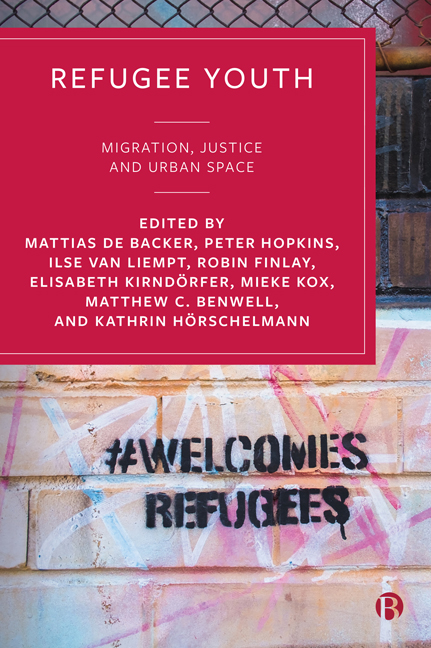Book contents
- Frontmatter
- Contents
- List of Figures and Tables
- Notes on Contributors
- Acknowledgements
- 1 Introducing Refugee Youth: Migration, Justice and Urban Space
- 2 Storying Belonging, Enacting Citizenship? (Dis)articulations of Belonging in a Community Theatre Project with Young Refugees and Asylum Seekers in Leipzig, Germany
- 3 Jackets and Jewellery: Racialised Dispossession and Struggles over Public Space in Denmark
- 4 Venezuelan Refugee Youth and Brazilian Schooling: The Individual between Languages and Spaces
- 5 The Inclusionary Potential and Spatial Boundaries of (Semi-)Public Space: Refugee Youth’s Everyday Experiences in the Urban Fabric of Amsterdam
- 6 Navigating ‘Purdah’ Culture in Urban Space: The Restricted Lives of Young Married Rohingya Refugees in Malaysia
- 7 Inclusive Urban Planning and Public Space for Refugee Youth in Pursuit of a Just City in Amman, Jordan
- 8 Sense of Belonging among Tibetan Refugees in India: A Case Study of the Bylakuppe Settlement in Karnataka, India
- 9 Negotiating Identity in Urban Space: Everyday Geographies of Syrian Students in Istanbul
- 10 ‘You’re Judged a Lot’: Australian Sudanese and South Sudanese Youths’ Perspectives on Their Experiences in Public Spaces
- 11 Hair Salons as ‘Private-Public Spaces’: Exploring the Experiences of Young Migrant Women in an Urban Township in South Africa
- 12 Emotion and Spatial Belonging: Exploring Young Migrant Men’s Emotional Geographies in Cork, Ireland
- 13 Homemaking through Music in Urban Africa: Creating Opportunities as a Refugee and a Migrant in Kinshasa and Dar es Salaam
- 14 Planetary Listening
- 15 Refugee Youth: Politics, Publicness and Visibility
- Index
1 - Introducing Refugee Youth: Migration, Justice and Urban Space
Published online by Cambridge University Press: 18 January 2024
- Frontmatter
- Contents
- List of Figures and Tables
- Notes on Contributors
- Acknowledgements
- 1 Introducing Refugee Youth: Migration, Justice and Urban Space
- 2 Storying Belonging, Enacting Citizenship? (Dis)articulations of Belonging in a Community Theatre Project with Young Refugees and Asylum Seekers in Leipzig, Germany
- 3 Jackets and Jewellery: Racialised Dispossession and Struggles over Public Space in Denmark
- 4 Venezuelan Refugee Youth and Brazilian Schooling: The Individual between Languages and Spaces
- 5 The Inclusionary Potential and Spatial Boundaries of (Semi-)Public Space: Refugee Youth’s Everyday Experiences in the Urban Fabric of Amsterdam
- 6 Navigating ‘Purdah’ Culture in Urban Space: The Restricted Lives of Young Married Rohingya Refugees in Malaysia
- 7 Inclusive Urban Planning and Public Space for Refugee Youth in Pursuit of a Just City in Amman, Jordan
- 8 Sense of Belonging among Tibetan Refugees in India: A Case Study of the Bylakuppe Settlement in Karnataka, India
- 9 Negotiating Identity in Urban Space: Everyday Geographies of Syrian Students in Istanbul
- 10 ‘You’re Judged a Lot’: Australian Sudanese and South Sudanese Youths’ Perspectives on Their Experiences in Public Spaces
- 11 Hair Salons as ‘Private-Public Spaces’: Exploring the Experiences of Young Migrant Women in an Urban Township in South Africa
- 12 Emotion and Spatial Belonging: Exploring Young Migrant Men’s Emotional Geographies in Cork, Ireland
- 13 Homemaking through Music in Urban Africa: Creating Opportunities as a Refugee and a Migrant in Kinshasa and Dar es Salaam
- 14 Planetary Listening
- 15 Refugee Youth: Politics, Publicness and Visibility
- Index
Summary
Introduction
According to the Global Trends report by the Office of the United Nations High Commissioner for Refugees (UNHCR), despite COVID-19-related movement restrictions and pleas from the international community for a ceasefire that would facilitate the COVID-19 response, displacement has continued to occur – and to grow. As a result, above 1 per cent of the world's population – or one in 95 people – is now forcibly displaced. This compares with one in 159 in 2010. At the end of 2020, because of persecution, conflict, violence, human rights violations and events seriously disturbing public order, 82.4 million people were forcibly displaced worldwide, of whom there were 20.7 million refugees under UNHCR's mandate, 5.7 million Palestine refugees under the United Nations Relief and Works Agency (UNRWA)'s mandate, 3.9 million Venezuelans displaced abroad, 4.1 million asylum seekers and 48 million internally displaced people. Meanwhile, during the process of this book being written, the ongoing war that Russia has enacted on Ukraine has led to over six million Ukrainians fleeing to neighbouring countries and beyond to escape the violence and danger of war.
In terms of international displacement situations under UNHCR's mandate alone, Syria topped the list with 6.8 million people, followed by Venezuela with 4.9 million people. Afghanistan and South Sudan came next, with 2.8 and 2.2 million respectively. Turkey continued to host the largest number of refugees with just under four million, most of whom were Syrian refugees (92 per cent). Colombia followed, hosting over 1.7 million displaced Venezuelans. Germany hosted the third largest population – almost 1.5 million, with Syrian refugees and asylum seekers as the largest group (44 per cent). Pakistan and Uganda completed the top-five hosting countries, with approximately 1.4 million each. In comparison, in 2009 there were 43.3 million forcibly displaced persons. Of this number, 27.1 million were internally displaced persons, 983,000 had pending asylum cases and 15.2 million were refugees. Of these refugees, 4.8 million were Palestinian refugees registered with UNRWA (Feldman, 2012).
UNHCR observed that more than half of the 65 million refugees and displaced people identified worldwide are under the age of 18, and a further significant number are in their very late teens or early twenties.
- Type
- Chapter
- Information
- Refugee YouthMigration, Justice and Urban Space, pp. 1 - 13Publisher: Bristol University PressPrint publication year: 2023



